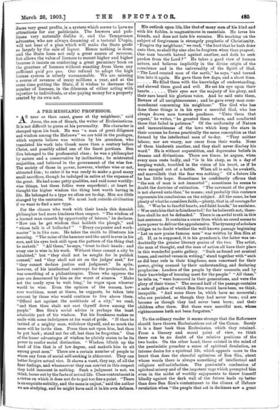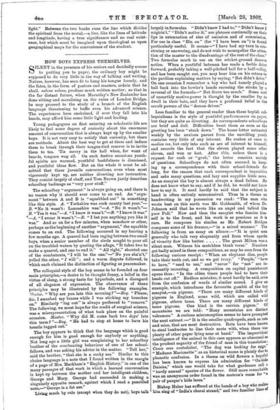A PRE-MESSIANIC PROFESSOR.
A S near as thou cant, guess at thy neighbour," said .As Jesus, the son of Sirach, the writer of Ecclesiasticus. It is not difficult to guess at his personality. His character is stamped upon his book. He was "a man of great diligence and wisdom among the Hebrews" we are told in the prologue, which experts believe was written by his grandson, who translated his work into Greek more than a century before Christ, and possibly added one of the finest portions. Ben Sirs belonged to the professorial class ; he was a philosopher by nature and a conservative by inclination; he mistrusted majorities, and believed in the government of the wise few. The society of those in power, however, whether wise or not, attracted him; to enter it he was ready to make a, good many small sacrifices, though he indulged in satire at the expense of the great. He had some petty qualities, and said some worldly- wise things, but these follies were superficial ; at heart he thought the higher wisdom the thing best worth having in life. He belonged to a type we often see to-day. Men are little changed by the centuries. We must look outside civilisation if we want to find a new type.
For the classes who work with their hands this donnish philosopher had more kindness than respect. " The wisdom of a learned man cometh by opportunity of leisure," he declares. "How can he get wisdom that holdeth the plough," and " whose talk is of bullocks ? " " Every carpenter and work- master" is in like case. He takes the smith to illustrate his meaning. " The noise of the hammer and the anvil is ever in his ears, and his eyes look still upon the pattern of the thing that he maketh." " All these," he says, "trust to their hands : and every one is wise in his work. Without these cannot a city be inhabited," but " they shall not be sought for in publick counsel," and "they shall not sit on the judges' seat," for "they cannot declare justice and judgment." In spite, however, of his intellectual contempt for the proletariat, he was something of a philanthropist. Those who oppress the poor are denounced by him as the worst of sinners. " Make not the needy eyes to wait long," he urges upon whoever would be wise. Even the opinion of the masses, how- ever worthless, must at times, he suggests, be taken into account by those who would continue to live above them. "Offend not against the multitude of a city," we read, "and then thou shalt not cast thyself down among the people." Ben Sira's social advice is perhaps the least admirable part of his wisdom. Yet his frankness makes us smile with some indulgence at his want of pride. " If thou be invited of a mighty man, withdraw thyself, and so much the more will he invite thee. Press thou not upon him, lest thou be put back ; stand not far off, lest thou be forgotten." One of the lesser advantages of wisdom he plainly states to be its power to confer social distinction. " Wisdom lifteth up the head of him that is of low degree, and maketh him to sit among great men." There are a certain number of people to whom any form of social self-seeking is abhorrent. They can better forgive actual vice. It shows a want, they say, of all the finer feelings, and whomsoever they can convict in this respect they hold innocent in nothing. Such a judgment is not, we think, borne out by the facts of actual life. Class contentmentis a virtue on which it does not do to put too fine a point. "There is an exquisite subtilty, and the same is unjust," said the author we are studying, and he might have said it in his own defence.
His outlook upon life, like that of many men of his kind and with his foibles, is magnanimous in essentials. He loves his friends, and does not hate his enemies. His teaching on the subject of forgiveness is strangely prophetic of Christianity. "Forgive thy neighbour," we read, " the hurt that he hath done unto thee, so shall thy sins also be forgiven when thou prayest. One man beareth hatred against another, and doth he seek pardon from the Lord ? " He takes a good view of human nature, and believes implicitly in the divine origin of the conscience and in the universality of the Spirit of God. " The Lord created man of the earth," he says, " and turned him into it again. He gave them few days, and a short time.
He filled them with the knowledge of understanding, and shewed them good and evil. He set his eye upon their hearts Their eyes saw the majesty of his glory, and their ears heard his glorious voice. And he said unto them, Beware of all unrighteousness ; and he gave every man com- mandment concerning his neighbour." The God who has done these things is in his eyes a merciful God, who has always drawn men towards goodness. " Unto them that repent," he writes, " he granted them return, and comforted those that failed in patience." Of the uniformity of Nature and inexorableness of the laws which keep the stars in their courses he forms practically the same conception as that formed by the intellectual man of to-day. " They neither labour, nor are weary, nor cease from their works. None of them hindereth another, and they shall never disobey his word." He is without superstition, and deprecates beliefs in dreams and divinations. There are times, he argues, when every man rests badly, and "is in his sleep, as in a day of keeping watch, troubled in the vision of his heart, as if he were escaped out of a battle. When all is safe, be awaketh, and marvelleth that the fear was nothing." Of a future life he has little hope. Sometimes he confidently affirms that " the son of man is not immortal " ; sometimes he seems to doubt the doctrine of extinction. " The covenant of the grave is not shewed unto thee," he muses ; and probably this sentence represents his conclusions on the subject. All the same, he has plenty of wbathe considers faith,—plenty, that is, of courage for life. " Woe be to fearful hearts, and faint hands," he exclaims.
Woe unto him that is fainthearted ! for he believeth not; there- fore shall he not be defended." There is an awful truth in this last sentence. It contains a curse from which no creed seems to have power to deliver the apprehensive. The tyranny of scholars obliges us to doubt whether the well-known passage beginning " Let us now praise famous men " was written by Ben Sira at all. If, as is supposed, it is his grandson's, the latter was un- doubtedly the greater literary genius of the two. The artist, the man of thought, and the man of action all have their, place in this wonderful poetic gallery. " Such as found out musical tunes, and recited verses in writing," stand together with "such as did bear rule in their kingdoms, men renowned for their power, giving counsel by their understanding, and declaring prophecies : Leaders of the people by their counsels, and by their knowledge of learning meet for the people." "All "these," he tells us, " were honoured in their generations, and were the glory of their times." •The second half of the passage contains a note of pathos of which Ben Sira, would have been, we think, incapable. "And some there be, which have no memorial; who are perished, as though they had never been; and are become as though they had never been born; and their children after them. But these were merciful men, whose righteousness hath not been forgotten."
To the ordinary reader it seems strange that the Reformers should have thrown Ecclesiasticus out of the Canon. Surely it is a finer book than Ecclesiastes, which they retained. From a literary and moral point of view, we think there can be no doubt of the relative positions of the two books. On the other hand, there existed in the mind-of the pessimistic preacher a sense of spiritual desolation, an intense desire for a spiritual life, which appeals more to the heart than does the cheerful optimism of Ben Sire; about whose words there is always something of intellectual and religious self-satisfaction. The pessimist's confession of spiritual misery and of theimpotent rage which prompted him even in the midst of worldly enjoyments to throw himself blindly against the dark wall of the future leads up better than does Ben Sire's contentment to the climax of Hebrew revelation when " the people that sat in darkness saw a great
light." Between the two books runs the line which divides the spiritual from the moral,—a line, like the lines of latitude and longitude, having a true significance and no real exist- ence, but which must be imagined upon theological as upon geographical maps for the convenience of the student.











































 Previous page
Previous page